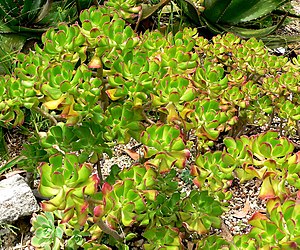Note: This is a project under development. The articles on this wiki are just being initiated and broadly incomplete. You can Help creating new pages.
Difference between revisions of "Sedum dendroideum - Tree stonecrop"
(Created page with "'''Sedum dendroideum''', commonly known as the '''tree stonecrop'''<ref name="int"/> or the '''false hens-and-chickens''', is a shrub-like perennial plant that looks much like...") |
Chaithrika (talk | contribs) (+image, some improvements) |
||
| Line 1: | Line 1: | ||
| − | '''Sedum dendroideum''', commonly known as the ''' | + | [[File:Sedum dendroideum 1.jpg|thumb|right|''Sedum dendroideum'']] |
| + | |||
| + | |||
| + | '''Sedum dendroideum''', commonly known as the ''''''<ref name="int"/> or the '''false hens-and-chickens''', is a shrub-like perennial plant that looks much like its Sempervivum look-alike. Native to Mexico,<ref name="int2"/> Sedum dendroideum plant thrives in warm, arid climates, as well as in cooler climates. It has been naturalized to California,<ref name="int3"/> and Ohio. | ||
== Uses == | == Uses == | ||
In traditional Brazilian medicine, the fresh juice from the leaves of the tree stonecrop plant is used for the treatment of gastric and inflammatory disorders.[Clarification needed] In 2005, a medical research paper was released studying its uses, finding it had antinociceptive and anti-inflammatory effects in mice. | In traditional Brazilian medicine, the fresh juice from the leaves of the tree stonecrop plant is used for the treatment of gastric and inflammatory disorders.[Clarification needed] In 2005, a medical research paper was released studying its uses, finding it had antinociceptive and anti-inflammatory effects in mice. | ||
| + | |||
| + | ==Common name== | ||
| + | |||
| + | * '''English''' - Tree stonecrop | ||
== References == | == References == | ||
Revision as of 11:12, 9 March 2017
'Sedum dendroideum, commonly known as the '[1] or the false hens-and-chickens, is a shrub-like perennial plant that looks much like its Sempervivum look-alike. Native to Mexico,[2] Sedum dendroideum plant thrives in warm, arid climates, as well as in cooler climates. It has been naturalized to California,[3] and Ohio.
Contents
Uses
In traditional Brazilian medicine, the fresh juice from the leaves of the tree stonecrop plant is used for the treatment of gastric and inflammatory disorders.[Clarification needed] In 2005, a medical research paper was released studying its uses, finding it had antinociceptive and anti-inflammatory effects in mice.
Common name
- English - Tree stonecrop
